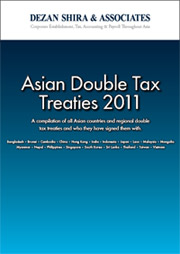Using Double Tax Treaties to Maximize China Investment Effectiveness
Op-Ed Commentary: Chris Devonshire-Ellis
 Dec. 16 – China has signed double tax agreements (DTAs) with many countries in treaties to limit taxation (tax treaties). Such treaties typically cover income taxes, value added taxes, withholding taxes and dividend taxes, among others. Tax treaties tend to reduce taxes of one treaty country for residents of the other treaty country in order to reduce double taxation of the same income. The provisions and goals vary; very few tax treaties are alike.
Dec. 16 – China has signed double tax agreements (DTAs) with many countries in treaties to limit taxation (tax treaties). Such treaties typically cover income taxes, value added taxes, withholding taxes and dividend taxes, among others. Tax treaties tend to reduce taxes of one treaty country for residents of the other treaty country in order to reduce double taxation of the same income. The provisions and goals vary; very few tax treaties are alike.
Most treaties, however, do the following:
- Define which taxes are covered and who is a resident and eligible for benefits
- Reduce the amounts of tax withheld from interest, dividends, and royalties paid by a resident of one country to residents of the other country
- Limit tax of one country on business income of a resident of the other country to that income from a permanent establishment in the first country
- Define circumstances in which income of individuals resident in one country will be taxed in the other country, including salary, self-employment, pension, and other income
- Provide for exemption of certain types of organizations or individuals
- Provide procedural frameworks for enforcement and dispute resolution
The stated goals for entering into a treaty often include reduction of double taxation, eliminating tax evasion, and encouraging cross-border trade efficiency. It is generally accepted that tax treaties improve certainty for taxpayers and tax authorities in their international dealings. Several governments and organizations have proposed model treaties to use as starting points in their own negotiations. The Organization for Economic Cooperation and Development (OECD, an inter-governmental organization) model treaty is often used as such a starting point. The OECD members have from time to time agreed on various provisions of the model treaty, and the official commentary and member comments thereon provide excellent guidance as to interpretation by each member country. China is not a member of the OECD, but does work closely with the organization and its frameworks.
Utilizing potential DTAs is something that needs to be discussed at the planning stage of any investment into China, as applications to government organizations such as customs and the tax bureau need to be made by the new entity in order to take advantage of the pertinent DTA. It should also be noted that not all tax bureaus in China are necessarily familiar with the concept, and may require professional assistance to have applicable reductions in tax recognized. The amounts can be significant, 50 percent savings on withholding taxes, dividend taxes and royalty payments for example. DTA pertinence should be considered for all licensing agreements between a China subsidiary and its overseas parent for example.
Understanding what DTA your own country has with China, and how to implement the regulations can mean savings of considerable amounts of money. It is generally an overlooked area of investment structuring into China, foreign investors both current and new to China should examine their DTA pertinence and seek professional advice if realizing they may be eligible for more favorable tax treatments than they are currently enjoying.
 China has entered into 95 DTAs, including with the United States and with most European countries. Details and applicable tax reductions differ between them, and it is impossible to detail all of them here. However, Dezan Shira & Associates has just produced a complimentary guide to the DTAs signed by 20 Asian countries, including China. It can be downloaded in pdf format by clicking the link here.
China has entered into 95 DTAs, including with the United States and with most European countries. Details and applicable tax reductions differ between them, and it is impossible to detail all of them here. However, Dezan Shira & Associates has just produced a complimentary guide to the DTAs signed by 20 Asian countries, including China. It can be downloaded in pdf format by clicking the link here.
Foreign investors in China who find they are pertinent candidates for DTA status and who wish to know what tax reductions may be applicable to them under the terms of their specific DTA may contact the firm at tax@dezshira.com for further assistance.
- Previous Article China Industry: December 15
- Next Article China Signs TIEA with Argentina









